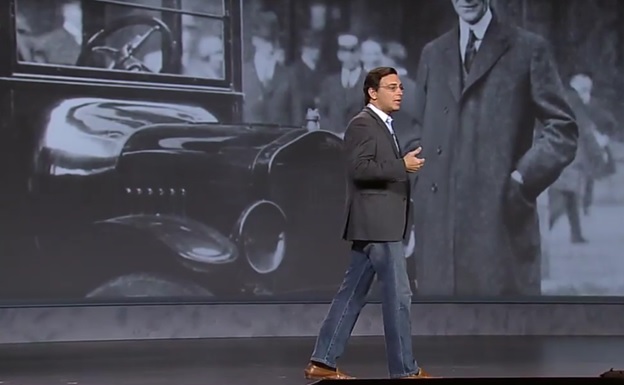As we wandered around the Las Vegas Convention Center and other casino hotels featuring the latest and greatest in gadgets and innovations at the Consumer Electronics Show earlier this month, you couldn’t help but wonder if something was missing.
 Yes, the gadgetry and innovative devices were amazing this year as we chronicled last week in our post about CES. But none of the big data, the amazing technology, the wearables, or the 4K TVs mean much without a strong social presence from brands and their interactions with consumers.
Yes, the gadgetry and innovative devices were amazing this year as we chronicled last week in our post about CES. But none of the big data, the amazing technology, the wearables, or the 4K TVs mean much without a strong social presence from brands and their interactions with consumers.
That was why it was gratifying to read a new piece from the Harvard Business Review by Ted Coiné and Mark Babbitt, authors of A World Gone Social. They essentially list “The 7 Attributes of CEOs Who Get Social Media” – that is, corporate chieftains who understand the fine art of using social media.
As Lori Lewis has preached since joining Jacobs Media, a company’s social media imprint comes directly from the corner office. Without a doubt, the Harvard Business Review agrees. In fact, they refer to CEOs who exude great social habits as “blue unicorns.” Yes, any unicorn is a rarity, but a captain of industry that truly grasps social is in an even rarer group.
One of these “blue unicorns” is the CEO of Tangerine, Peter Aceto. Here’s his money quote:
“I would rather engage in a Twitter conversation with a single customer than see our company attempt to attract the attention of millions in a coveted Super Bowl commercial.”
So this is either a guy who doesn’t have $4.5 million laying around for a 30-second spot in “the big game” or it’s someone who truly understands what it means to connect with consumers, one person at a time.
Reading a bit in between the lines at CES, there were indications that, in fact, the individual is becoming more important; that a “many to one” approach is taking flight as more companies create content, platforms, and gadgets that allow consumers to craft their media, entertainment, and even consumer goods on a highly personalized basis.
Whether it’s wearables, fitness gear, hi-tech kitchens, smartphones, or “connected cars,” the individual and her tastes have been elevated to levels that Henry Ford and his assembly line could have never envisioned. Back in those early automotive days, Ford once said this about his famous Model T:
“Any customer can have a car painted any color that he wants so long as it is black.”
Contrast that with Ford’s new CEO Mark Fields. While he has infinite respect for the founder of his company and that legendary 20th century philosophy about making the lives of Americans better, when it comes to focusing on one customer at a time, there’s a different attitude coming out of Dearborn these days.
One of Ford’s innovative experiments is to collect vehicle data that can improve an individual’s mobility experience. This includes using driver profiles to personalize insurance rates. Getting to know individual customers and connecting with them suggests a paradigm shift in the “assembly line” that so many companies once aspired to achieve.
So thinking about the seven social attributes noted by Ted Coiné and Mark Babbitt, perhaps there will be more corporate “blue unicorns” emerging in the coming year – especially in the broadcasting business – an industry famous for mass reach that now would be well-served to rethink those givens and take a more personalized approach to reaching consumers with great content and relevant advertising messages.
Not surprisingly, that philosophy is at the core of building brands that are social and focus on the individual. According to the authors, CEOs who get it…
- Have an insatiable curiosity. And that covers opinions about their brands, the competition, and listening to what consumers have to say.
- Have a DIY mindset. They do much of the work themselves rather than push it off on assistants, and they take the time to talk to employees and customers.
- Have a “Bias For Action.” This is all about having to act even if there’s no research or an obvious opportunity. It means being online, living in
 real-time, and not being afraid to make a quick, tough decision.
real-time, and not being afraid to make a quick, tough decision. - Are relentless givers. Yes, they care about profitability, but they also pay it forward, mentor, and care about social issues. They connect, share, and interact with others because it’s “the right thing to do.”
- Connect instead of promote. This translates to interacting with everybody, from employees to stakeholders, dealing honest with investors and building relationships.
- Are the company’s #1 brand ambassadors. They are the face of the company and as the authors remind us, people’s impressions of corporations are very much driven by the person at the top. This means spending time with social media in “an authentic and generous way,” which of course, builds the company brand.
- Lead with an OPEN mindset. And that means “Ordinary People, Extraordinary Network.” Or the realization that it takes an army to solve problems because no one person holds the key to success. This means truly being social in order to utilize the power of the network.
These are tall orders, and I considered these seven attributes when thinking about the radio broadcasting industry and the leaders who stand out for these dimensions, as well as my own ability as head my company to be a truly social CEO. It’s not an easy transition, but it’s a necessary one.
As the authors point out, the rules have changed.
And as they warn, there may come a day when there will only be two types of CEOs: “social…and retired.”
I’m shooting to be the former.
- What To Do If Your Radio Station Goes Through A Midlife Crisis - April 25, 2025
- A 2020 Lesson?It Could All Be Gone In A Flash - April 24, 2025
- How AI Can Give Radio Personalities More…PERSONALITY - April 23, 2025





Another must read! Communication is a must for success. All media is social! Thanks, again, Fred. Clark
Thanks, Clark!
Yep…thanks
Back at you.